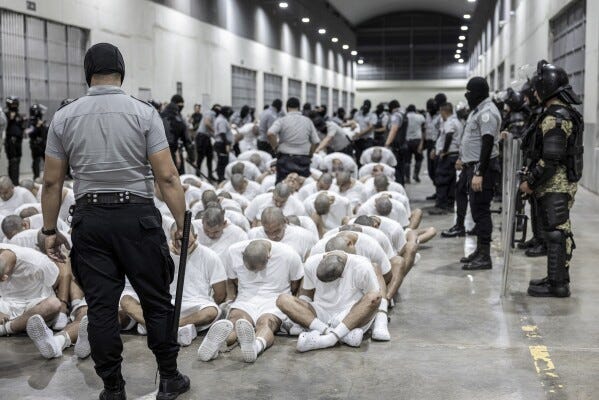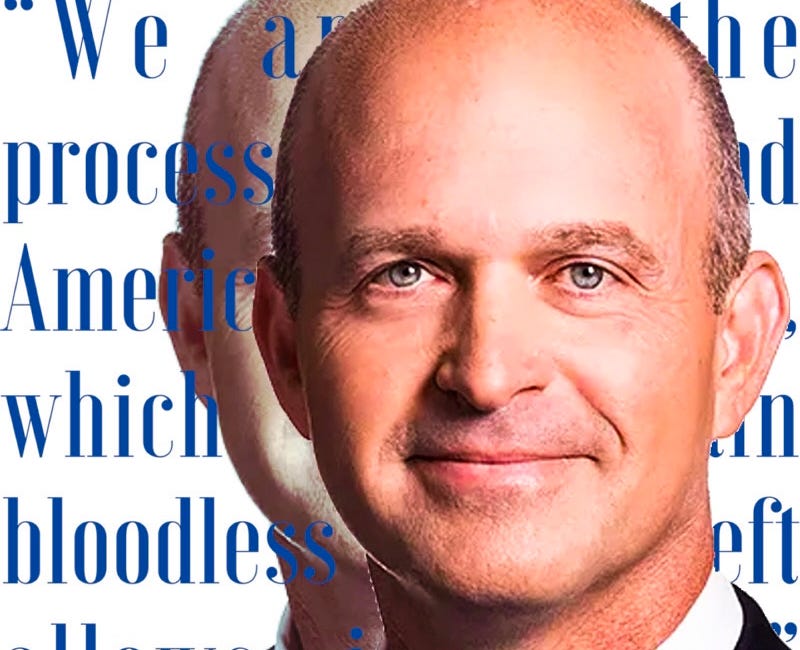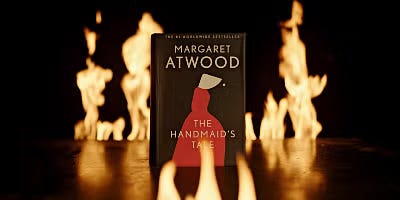Someone must have slandered Josef K., for one morning, without having done anything wrong, he was arrested.
—Franz Kafka, The Trial (translated by Breon Mitchell)
This was an administrative error. (Not that we should say publicly.)
Content warning: descriptions of torture and violence against prisoners.
A few weeks ago, the New York Times reported on the behind-the-scenes fiasco that has been the Trump administration’s wrongful, illegal, and unconstitutional deportation of Kilmar Abrego Garcia, who was kept for almost three months in an El Salvadoran mega-prison, despite a judge’s 2019 injunction against deporting him to El Salvador, explicitly because his life was in danger in that country.
The first line of the Times piece is “A mistake had been made”.
For me, it immediately calls to mind the famous opening sentence of Franz Kafka’s novel (unfinished at his death) The Trial. Probably the most famous English translation of this line, from Willa and Edwin Muir, reads, “Someone must have been telling lies about Joseph K., for without having done anything wrong he was arrested one fine morning”.
That line, like the first line of The Metamorphosis (“When Gregor Samsa awoke one morning from troubling dreams, he found himself transformed in his bed into a monstrous vermin”) encapsulates everything that follows.
Although it’s often quite funny, The Trial is, in terms of plot, a horror novel.
Our protagonist, Josef K., whose last name is never given, discovers he has been accused of a terrible crime, but no one will tell him what that crime is. There seems to be no way to defend himself. And his life in a “a state governed by law, [where] there was universal peace,” where “all statutes were in force,” suddenly becomes a nightmare when an incomprehensible capital-L “Law” decrees him guilty.
In Breon Mitchell’s 1998 translation, Josef speaks of the “law” while his jailers say they have been sent by the “Law”; this subtle distinction is potentially the key to Kafka’s story “Before the Law,” which appears as part of a later chapter in the novel. One way to read this is that the officials who have declared Josef guilty are appealing to something unkownable that— if it exists at all— stands outside or above the laws put in place by human society.
In “Before the Law,” a man tries to gain entry into something called “the Law” (depicted as a physical building). He waits for many years, and when he is dying of old age, the guard to what has seemed to be the only door to the structure says “…this entrance was assigned only to you. I’m going now to close it.”
In terms of tone, Kafka, is a master of blending horror with surreal humor. Anyone who has come up against the stupid immovability of a poorly-tuned (or maliciously designed) bureaucratic machine might relate to Josef K. as he explores the physical and psychological apparatus of a legal system that seems wholly disinterested in him as a person, which has apparently foreordained his guilt, and which because of its lack of transparency, may very well have just gotten the wrong guy.
It’s the horror of that last part that connects with Abrego Garcia’s case. Apparently, Abrego Garcia was added to a flight transporting deported people from the US to El Salvador at the last minute, after another deportee was removed.
Individuals in the Trump administration made what they have repeatedly called an “administrative error” when they sent Abrego Garcia to the brutal “terrorist” prison CECOT in El Salvador— the action the judge explicitly forbid in 2019.
They have not publicly claimed they did this on purpose, and that arguably makes Abrego Garcia’s fate even worse to behold.
Imagine a system that not only seeks to harm you as a member of a faceless class it has created, but can’t even be bothered to follow its own procedures as it clumsily tosses you into a dark hole.
That is what most people mean when they say Kafkaesque.
In an apparent effort to cover up their hideous “error”, as the Times reports,
D.H.S. officials discussed trying to portray Mr. Abrego Garcia as a “leader” of the violent street gang MS-13, even though they could find no evidence to support the claim. They considered ways to nullify the original order that barred his deportation to El Salvador. They sought to downplay the danger he might face in one of that country’s most notorious prisons.

According to human rights organization Christosal (via the Associated Press), “last year… at least 261 people had died in El Salvador’s prisons during the [President Nayib Bukele’s] gang crackdown. The group and others have cited cases of abuse, torture and lack of medical attention.”
Prisoners in CECOT cannot see visitors, cannot participate in recreational activities, and don’t receive educational services.
According to a report from Human Rights Watch,
The Salvadoran government has described people held in CECOT as “terrorists,” and has said that they “will never leave.” Human Rights Watch is not aware of any detainees who have been released from that prison. The government of El Salvador denies human rights groups access to its prisons and has only allowed journalists and social media influencers to visit CECOT under highly controlled circumstances. In videos produced during these visits, Salvadoran authorities are seen saying that prisoners only “leave the cell for 30 minutes a day” and that some are held in solitary confinement cells, which are completely dark.
While it’s hard to know exactly what’s happening in CECOT, prisoners who have been released from other Salvadoran prisons have reported being beaten, kicked, forced to lay on the ground naked, forced into crowded cells without light, forced into barrels full of ice, denied regular medication, and subject to “filthy” and unsanitary conditions.
When a Justice Department senior employee suggested the obvious, that the US rectify its mistake and bring Abrego Garcia back from El Salvador, he was fired.
The Department of Homeland Security claimed (apparently untruthfully) that Abrego Garcia’s case was part of an “counterterrorism operation with national security implications” and “invoked state secrets privilege” (again according to the Times).
The bumbling back-and-forth between at least three government agencies over whether or not, and how, to either bring Abrego Garcia home or to cover up the details of the “error,” brings to mind another Kafka novel, The Castle, which involves mostly-unseen bureaucrats at the titular Castle making byzantine policy decisions.
At one point, a character in that novel explains, “When a matter has been deliberated on at great length, it can happen, even before deliberations have ended, that suddenly, like lightning, in some unforeseeable place, which cannot be located later on, a directive is issued that usually justly but nonetheless arbitrarily, brings the matter to a close.”
But of course, the darker motivation behind the real-life farce of Abrego Garcia’s treatment seems to be a rapid expansion of executive power, planned in advance by people like self-described “Christian nationalist” Russell Vought (one of the masterminds of Project 2025) before Trump’s term in office began.
It is telling that El Salvador, the Trump administration’s partner in the unconstitutional detentions, declared an ongoing “state of emergency” in 2022, which, according to Human Rights Watch, has “suspended constitutional due process rights” in the country. That “emergency” has now lasted almost three years, and has resulted in the detentions of thousands of citizens.
What is Project 2025? (Part I)
Please subscribe or consider upgrading your subscription. Subscribers make this possible.
It seems clear we should see the detentions, and recent actions by the Trump administration— such as activating the National Guard to deal with largely peaceful protests in California, over the objections of local officials— as part of a steady erosion of constitutional protections in the US. (There has been violence in California, but the state’s governor and LA’s mayor have openly rejected the use of the National Guard and the mobilization of Marines to deal with the protests.)
Repeatedly, the Trump administration has used sweeping (and, according to multiple courts, illegal) interpretations of laws like the Alien Enemies Act, and claims of “national emergency” to take actions normally reserved only for Congress.
President Trump, on his social media platform Truth Social, alleged a “Migrant Invasion” of Los Angeles to justify the California actions.
Similarly, the Salvadoran government recently arrested a lawyer for a human rights organization, using the special powers created by its ongoing “state of emergency” , an echo of US federal agents arresting a judge in April for “interfering” with ICE’s attempt to arrest a defendant in her court.
It all looks uncomfortably like the parts of history that inspired Kafka’s work.
Kafka, who died in 1924 of tuberculosis, would have very likely died in a Nazi concentration camp otherwise, as his sisters ultimately did.
Kafka wrote The Trial around 1915; it was an unfinished draft, and was only published— technically against Kafka’s wishes— after his death, by his friend Max Brod in 1924. Fifteen years later, under the Munich agreement, the Nazis had occupied what was then Czechoslovakia, Kafka’s home country.
According to the publisher’s note by Arthur Samuelson that begins Breon Mitchell’s translation of The Trial, “Between 1933 and 1938 German Jews were barred from teaching or studying in ‘German’ schools, from publishing or being published in ‘German’ newspapers or publishing houses, or from speaking and performing in front of ‘German’ audiences”.
It’s hard to know how much of this was writing on the wall just two decades earlier, when he was writing The Trial, but while Kafka’s style leans heavily on absurd exaggeration, the events of the novels are probably not as exaggerated as a modern reader might like to believe.
While The Trial takes place in a nameless state with a labyrinthine legal system that proves to be ultimately impenetrable to Josef K., for Kafka the legal system was also a practical reality. (Perhaps its inconsistencies and mistakes inspired Josef K.’s trials, caught between “law” and “Law”.)
As Jefferson Gray writes in a review of one of Kafka’s works for the Federal Bar Association, Kafka was an attorney who “graduated from Charles University in Prague with his law degree in June 1906, spent a year handling cases for the indigent in the city’s Provincial and Criminal Courts, and then endured nine months of drudgery working for the local office of a large Italian insurance company.” He ended up changing careers and by the time he was writing the novels he worked for a worker’s compensation agency (where he was undoubtedly exposed to plenty of government bureaucracy).
The Austro-Hungarian empire in which Kafka lived most of his life (the empire dissolved in 1918) was a complex bureaucracy, one the author probably knew intimately as an attorney and as a bureaucrat. It’s easy to believe that the small, daily, brutal injustices Kafka’s characters often face represent the kinds of real-life injustices that would snowball into the genocidal fascism of the Nazis.
In America right now, of course (and in many other countries), Josef K.’s predicament is more or less literal for many people. US legal permanent residents, visa holders, undocumented immigrants (who are entitled to due process under the constitution), and citizens, have all been caught up in the Trump administration’s sweeping dragnet, which is clearly aimed at terrifying immigrants (both documented and undocumented) and punishing asylum seekers, who, under US code, have a right to seek a safe place in the United States if there is a danger they will be persecuted in their country of origin upon returning.
The Trump administration finally did bring back Kilmar Abrego Garcia this month, long after a court had ordered that it do so in April, and after the US Supreme Court directed the government to “facilitate” his return. When it did so, the Justice Department indicted Abrego Garcia with alleged “human trafficking” crimes— allegations the government never made during the three months he was being held in CECOT, and which, based on the Times’ reporting, don’t seem to have come up during the scramble to find a reason to keep Abrego Garcia in El Salvador.
Even if the government is able to make a valid legal case that Abrego Garcia was a human trafficker— a claim that seems to explicitly belie its earlier unsubstantiated accusations that Abrego Garcia was a gang leader— that will not change the fact that he was sent to a foreign prison where he might have been tortured or killed, despite an explicit order from a judge forbidding exactly that.
The fact that Abrego Garcia did not come to the US through a legal process also doesn’t change the fact that a US immigration court explicitly ruled he could not be deported to El Salvador.
And no indictment can change the fact that he was picked up and sent to El Salvador, with no due process, in a politically-motivated roundup of “immigrants” (a word the current president has often wielded as a slur), not because of a crime he had committed, but because the administration made an “error” in its haste to deport as many human beings as possible, to potentially dangerous conditions, from which many of them had sought asylum in the United States.
The developing protests in California and elsewhere are likely a response not only to the injustice and immorality of denying lawful due process, of punishing asylum seekers, of deliberately putting human beings into dangerous and horrible circumstances, but to the very real threat these moves pose for all of us.
Martin Luther King, Jr., wrote, in Letter From Birmingham Jail, “Injustice anywhere is a threat to justice everywhere”.
Former Hitler supporter and clergyman Martin Niemöller (later sent to a Nazi concentration camp) gave sermons and speeches that were synthesized by various sources into a poem beginning, “First they came for the Communists/ And I did not speak out/ Because I was not a Communist.”
Those words weren’t just poetry. What we allow to happen to our neighbors can eventually happen to us.
What Kafka imagined happening to Josef K. did really happen to millions of people throughout Europe just a few years later, during the Holocaust.
And it happened, in a different way, to around 120,000 Japanese Americans, who the US government interned, without due process, in prison camps during World War II. (And, of course, Hitler explicitly based many of his plans on US racial policy.)
It obviously doesn’t take a fascist regime to deport people and deny their due process, and we shouldn’t resist these things only when fascist regimes do them. Allowing them to happen without opposition is what creates fascist regimes. Seeing that violent, dehumanizing, extrajudicial behavior can be carried out without consequence can embolden proto-fascists into becoming full-on fascists.
Kafka didn’t live to see the rise of the Nazi Party as we think of it today, but the Party was founded in 1919, and directed by Hitler by 1920. In 1923, a year before Kafka’s death, Nazis in Munich, led by Hitler, attempted an unsuccessful and chaotic coup intended to destroy the constitutional Weimar Republic. (The Bavarian government used “emergency jurisdiction” to hold a trial for Hitler and his co-conspirators overseen by pro-Nazi judges; Hitler served only about nine months in prison, during which time he wrote Mein Kampf. He left prison a famous man because of the attempted coup.)
Kafka faced a historical period of growing antisemitism in Europe, and he and his circle were keenly aware of what would become the major thought movements of the twentieth century.
While The Trial is not an overtly political work, it is very easy to read it not as a dark fantasy or “dystopia,” but as a response to the real anxieties of the age, anxieties that crystalized in the rise of fascism across Europe, that found their terrible realization in the Holocaust.
As translator Breon Mitchell writes in his preface, “The Trial begins as farce and ends in tragedy”.
Ways to support this work:




Not sure it's ever a good day when we're starting with Kafka references. But thank you for this for it is indeed far too accurate.
Excellent post! Your comparisons are spot on.